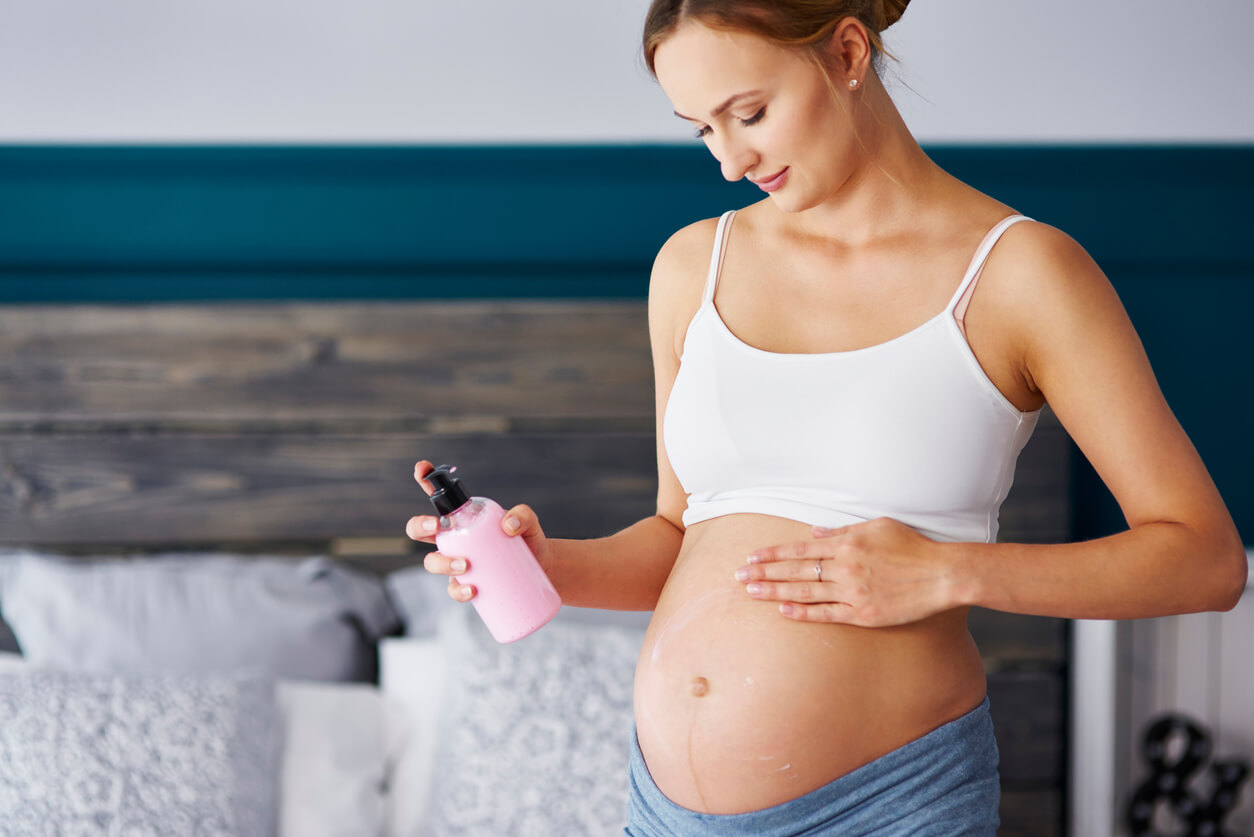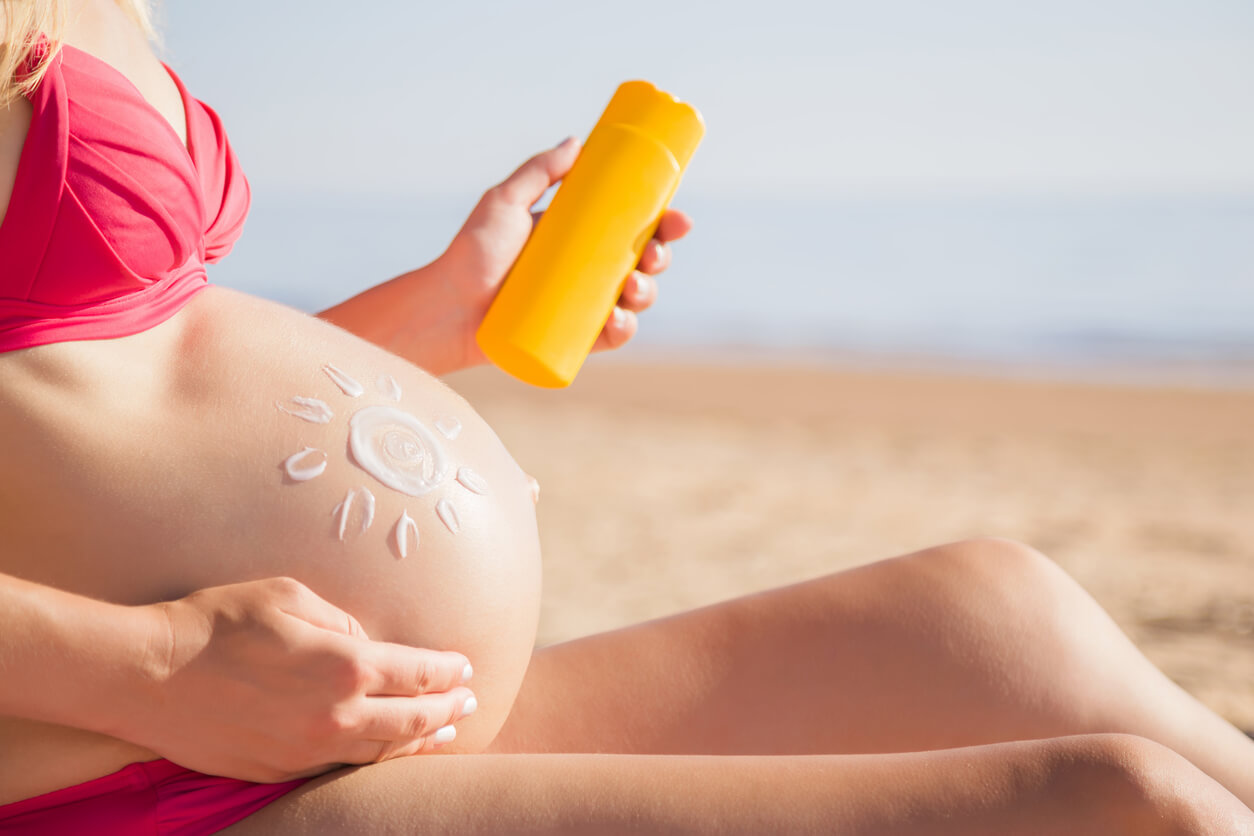Creams and Lotions for Pregnant Women: How to Choose?

During pregnancy, the skin undergoes multiple changes that can be counteracted with the daily use of creams and lotions for pregnant women. Stretch marks, cellulite, and blemishes are some of the most frequent dermatological manifestations that pregnant women experience. Therefore, in this article, we’ll tell you how to choose the most appropriate products for this stage. Are you interested? Keep reading!
Appropriate creams and lotions for pregnant women
During the course of pregnancy, the face maintains a characteristic glow and it’s best to help it with creams and lotions so that your skin looks clean and hydrated at all times. Take note of our most recommended products.
Daily cleansing creams
One of the essential steps in skincare routines is cleansing. This should be done before the application of creams, serums, or lotions. What’s more, cleansers that are hypoallergenic and with a neutral pH are ideal for this purpose.
Also, it’s a good idea to moisten your face first. Then, apply a generous amount of cleanser, massage gently, and rinse to remove the product.
It’s worth noting that the skin should be cleaned every day, both in the morning and before bed.
Moisturizing lotions for pregnant women
Moisturizing lotions are one of the most recommended options to add to your skincare routine during pregnancy. Moisturizing emulsions preserve the skin and keep it in healthy condition, with greater elasticity and a reduced probability of suffering stretch marks due to distension.
Products with a high content of vitamin A, vitamin E, allantoin, and hyaluronic acid should be applied to the entire length of the dermis daily.
Although its application is recommended every day, some components of these creams are contraindicated at this stage. These include the following:
- Very strong acids
- Retinol
- Certain depigmenting agents (hydroquinone and derivatives)
- Some variants of essential oils or algae
Anti-stretch mark cosmetic products

Pregnancy produces multiple hormonal changes that can alter a woman’s nails, hair, and skin. This occurs because the skin tissue becomes more reactive, more delicate, and more prone to injury.
Stretch marks are caused by the breakdown of collagen fibers and elastic fibers of the skin, due to the excessive distension of pregnancy.
For the prevention or treatment of stretch marks, the use of rosehip oil or jojoba oil is recommended from the first trimester, to provide the elasticity that the skin requires during pregnancy.
The increase in size and weight typical of pregnancy make moisturizers the basic cosmetic products in your routine. This is because proper hydration of the skin surface helps to combat the appearance of stretch marks.
Cellulite creams
Although there are multiple creams designed to eliminate cellulite, this isn’t as real as it appears. In fact, it’s best is to use moisturizing creams and apply them with gentle massages, in the direction of lymphatic drainage.
Also, it’s important to prevent circulatory problems and fluid retention in the body.
It’s worth mentioning that no cosmetic product eliminates cellulite completely, but there are some that are capable of reducing it. For example, those that contain the following active ingredients:
- Coenzyme Q 10: Stimulates cell regeneration.
- Centella Asiatica: Has firming and remineralizing properties.
- L-carnitine: Promotes the metabolism of lipids by dissolving fats and thus combats cellulite.
- Ruscogenin: Has properties that protect the blood vessel.
- Gingko Biloba: Has antioxidant properties and prevents the fragility of blood capillaries.
Beyond creams, to combat cellulite, it’s important to perform appropriate physical exercise, maintain a balanced and complete diet, as well as assure sufficient daily hydration.
Sunscreens
Although the application of sunscreen is recommended for all people, the daily and constant use of sunscreen during pregnancy is very important. This is because the skin of pregnant women is more susceptible to developing hyperpigmented spots.
Gestational chloasma is a common condition in pregnant women and is characterized by dark, symmetrical spots on the face. In fact, according to a publication by The American Academy of Dermatology Association, 90% of people with chloasma are women.
It’s advisable to use sun screens with sun protection factor (SPF) 50, which may be available in the following presentations:
- Lotions
- Creams
- Ointments
- Gels
- Aerosol sprays
- Bars
The use of broad-spectrum sun creams (for UVA and UVB rays) is essential to guarantee greater protection. Even those that don’t contain PABA (4-aminobenzoic acid) are ideal.
In addition to choosing the appropriate product, the FDA advises applying 2 milligrams of sunscreen to dry skin and renewing every 2 hours.

The importance of creams and lotions for pregnant women
It’s important for pregnant women to remove their fear of using cosmetic products or creams, as there’s no reason for avoiding them completely. Also, whenever doubts are generated in this regard, it’s best to consult with your family doctor.
Given all the benefits that we’ve mentioned, the use of creams and lotions at this stage is a recommendation from experts and it’s important to ensure that they’re products suitable for gestational changes.
During pregnancy, the skin undergoes multiple changes that can be counteracted with the daily use of creams and lotions for pregnant women. Stretch marks, cellulite, and blemishes are some of the most frequent dermatological manifestations that pregnant women experience. Therefore, in this article, we’ll tell you how to choose the most appropriate products for this stage. Are you interested? Keep reading!
Appropriate creams and lotions for pregnant women
During the course of pregnancy, the face maintains a characteristic glow and it’s best to help it with creams and lotions so that your skin looks clean and hydrated at all times. Take note of our most recommended products.
Daily cleansing creams
One of the essential steps in skincare routines is cleansing. This should be done before the application of creams, serums, or lotions. What’s more, cleansers that are hypoallergenic and with a neutral pH are ideal for this purpose.
Also, it’s a good idea to moisten your face first. Then, apply a generous amount of cleanser, massage gently, and rinse to remove the product.
It’s worth noting that the skin should be cleaned every day, both in the morning and before bed.
Moisturizing lotions for pregnant women
Moisturizing lotions are one of the most recommended options to add to your skincare routine during pregnancy. Moisturizing emulsions preserve the skin and keep it in healthy condition, with greater elasticity and a reduced probability of suffering stretch marks due to distension.
Products with a high content of vitamin A, vitamin E, allantoin, and hyaluronic acid should be applied to the entire length of the dermis daily.
Although its application is recommended every day, some components of these creams are contraindicated at this stage. These include the following:
- Very strong acids
- Retinol
- Certain depigmenting agents (hydroquinone and derivatives)
- Some variants of essential oils or algae
Anti-stretch mark cosmetic products

Pregnancy produces multiple hormonal changes that can alter a woman’s nails, hair, and skin. This occurs because the skin tissue becomes more reactive, more delicate, and more prone to injury.
Stretch marks are caused by the breakdown of collagen fibers and elastic fibers of the skin, due to the excessive distension of pregnancy.
For the prevention or treatment of stretch marks, the use of rosehip oil or jojoba oil is recommended from the first trimester, to provide the elasticity that the skin requires during pregnancy.
The increase in size and weight typical of pregnancy make moisturizers the basic cosmetic products in your routine. This is because proper hydration of the skin surface helps to combat the appearance of stretch marks.
Cellulite creams
Although there are multiple creams designed to eliminate cellulite, this isn’t as real as it appears. In fact, it’s best is to use moisturizing creams and apply them with gentle massages, in the direction of lymphatic drainage.
Also, it’s important to prevent circulatory problems and fluid retention in the body.
It’s worth mentioning that no cosmetic product eliminates cellulite completely, but there are some that are capable of reducing it. For example, those that contain the following active ingredients:
- Coenzyme Q 10: Stimulates cell regeneration.
- Centella Asiatica: Has firming and remineralizing properties.
- L-carnitine: Promotes the metabolism of lipids by dissolving fats and thus combats cellulite.
- Ruscogenin: Has properties that protect the blood vessel.
- Gingko Biloba: Has antioxidant properties and prevents the fragility of blood capillaries.
Beyond creams, to combat cellulite, it’s important to perform appropriate physical exercise, maintain a balanced and complete diet, as well as assure sufficient daily hydration.
Sunscreens
Although the application of sunscreen is recommended for all people, the daily and constant use of sunscreen during pregnancy is very important. This is because the skin of pregnant women is more susceptible to developing hyperpigmented spots.
Gestational chloasma is a common condition in pregnant women and is characterized by dark, symmetrical spots on the face. In fact, according to a publication by The American Academy of Dermatology Association, 90% of people with chloasma are women.
It’s advisable to use sun screens with sun protection factor (SPF) 50, which may be available in the following presentations:
- Lotions
- Creams
- Ointments
- Gels
- Aerosol sprays
- Bars
The use of broad-spectrum sun creams (for UVA and UVB rays) is essential to guarantee greater protection. Even those that don’t contain PABA (4-aminobenzoic acid) are ideal.
In addition to choosing the appropriate product, the FDA advises applying 2 milligrams of sunscreen to dry skin and renewing every 2 hours.

The importance of creams and lotions for pregnant women
It’s important for pregnant women to remove their fear of using cosmetic products or creams, as there’s no reason for avoiding them completely. Also, whenever doubts are generated in this regard, it’s best to consult with your family doctor.
Given all the benefits that we’ve mentioned, the use of creams and lotions at this stage is a recommendation from experts and it’s important to ensure that they’re products suitable for gestational changes.
All cited sources were thoroughly reviewed by our team to ensure their quality, reliability, currency, and validity. The bibliography of this article was considered reliable and of academic or scientific accuracy.
- Melasma: diagnosis and treatment. [Internet]. Disponible en: https://www.aad.org/public/diseases/a-z/melasma-treatment#causes
- Bylka W, Znajdek-Awiżeń P, Studzińska-Sroka E, Brzezińska M. Centella asiatica in cosmetology. Postepy Dermatol Alergol. 2013 Feb;30(1):46-9. doi: 10.5114/pdia.2013.33378. Epub 2013 Feb 20. PMID: 24278045; PMCID: PMC3834700.
- Bozzo, P., Chua-Gocheco, A., & Einarson, A. (2011). Safety of skin care products during pregnancy. Canadian family physician Medecin de famille canadien, 57(6), 665–667.
- Ananthapadmanabhan KP, Moore DJ, Subramanyan K, Misra M, Meyer F. Cleansing without compromise: the impact of cleansers on the skin barrier and the technology of mild cleansing. Dermatol Ther. 2004;17 Suppl 1:16-25. doi: 10.1111/j.1396-0296.2004.04s1002.x. PMID: 14728695.
This text is provided for informational purposes only and does not replace consultation with a professional. If in doubt, consult your specialist.








